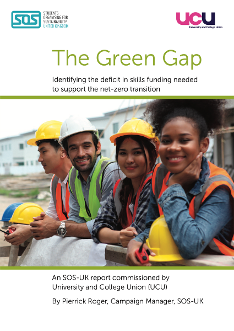Green skills & jobs
9 July 2025
 The Green Gap
The Green Gap
Identifying the deficit in skills funding needed to support the net-zero transition
This UCU commissioned report1 assesses the UK's preparedness to deliver the workforce required for a successful transition to a net-zero economy by 2030. It identifies significant challenges across the skills system, particularly within the further education sector, and concludes that the UK is not currently on track to meet its green skills targets and makes clear recommendations to address the green skills gap.
Key findings:
- The estimated additional cost of training new workers to meet net zero demand in just two major sectors, energy and construction, is an additional £1.7 billion between 2025 and 2030.
- The energy sector will require 130,000 new workers by 2030 to meet projected growth. Current Government skills programmes fall well short of matching this demand.
- The UK's current FE teacher workforce is underpaid compared to industry roles, and colleges report acute difficulty recruiting instructors in key net-zero skill areas.
- FE colleges report major challenges in accessing the capital investment needed to deliver net-zero training.
- The delivery of net-zero skills is highly uneven across regions, with limited strategic oversight or forecasting to guide training provision.
- Local partnerships between FE providers, employers and local authorities are proving effective models for delivery.
![]() The Green Gap - the deficit in skills funding needed to support the net-zero transition [1mb]
The Green Gap - the deficit in skills funding needed to support the net-zero transition [1mb]
Note: Education is a devolved area of policy. This report looks at funding for FE and adult skills in England, where FE colleges may get funding from different sources. While the overall levels of funding in England are set by central government, how the Adult Education Budget, as well as other funding sources, is allocated has increasingly been devolved to nine mayoral combined authorities and the Greater London Authority. This emphasises the importance these devolved bodies have over prioritising green skills and a Just Transition.
Click to see how Wales and Scotland are dealing with Just Transition and upskilling.
Closing the Green Skills Gap
Local and regional policy briefing
Local and mayoral authorities will be on the front lines of the UK's net-zero transition. With the current green skills provision being inadequate, local authorities are uniquely placed to align green skills training with infrastructure development, industrial growth, and regional economic priorities. Our key recommendations:
- champion local green skills investment
- embed green skills into public infrastructure plans
- address technical educator shortages
- prioritise inclusion and regional fairness.
![]() Closing the Green Skills Gap: local and regional policy briefing [135kb]
Closing the Green Skills Gap: local and regional policy briefing [135kb]
National policy briefing
The UK government has committing to cutting greenhouse gas emissions by 81% by 2035, but the current green skills provision is inadequate. FE institutions are key to delivering green technical qualifications but face major structural barriers. Without urgent intervention, the UK risks missing climate targets due to an insufficiently skilled workforce and there is only a narrow window for the UK parliament to implement funding reforms that match green workforce planning with climate ambitions and industrial strategy. Our key recommendations for government are:
- establish a National Delivery Plan for green skills
- increase baseline pay for technical educators in FE
- ringfence green skills funding within existing budgets
- create a national network of Low Carbon Centres for Excellence
- scale and sustain place-based partnerships.
![]() Closing the Green Skills Gap: national policy briefing [147kb]
Closing the Green Skills Gap: national policy briefing [147kb]
 Greener Jobs Alliance (GJA)
Greener Jobs Alliance (GJA)
Latest newsletter
Read the latest GJA newsletter here
The founding members of the GJA are the University and College Union, Trades Union Congress, Greenpeace, Friends of the Earth, National Union of Students, People & Planet, and the Institute of Public Policy Research.
Community approaches to the Green Deal
UCU helped to produce a film entitled 'Community approaches to the Green Deal' it is based on a project carried out in the FE sector but HE reps should also find it of interest. The intention is that it can be used as an education for sustainable development resource for training and meetings of staff and students.
More about the Greener Jobs Alliance
The Greener Jobs Alliance was launched to promote skills training and job creation to meet the needs of Britain's rapidly growing low-carbon sectors and to green the whole economy.
The transition to a low-carbon and resource-efficient economy can drive sustainable economic recovery and job creation in every part of the country as well as making existing jobs more secure. But this requires a more strategic national and local approach to deliver the workforce skills needed and to stimulate demand for clean energy and energy efficiency services.
The Greener Jobs Alliance will liaise at a national and local level to build the broadest possible support for the policies, investment, partnerships and commitments needed to drive the transition to a low carbon economy.
If you require any further information please contact Position vacant.
- PrintPrint this page
- Share

